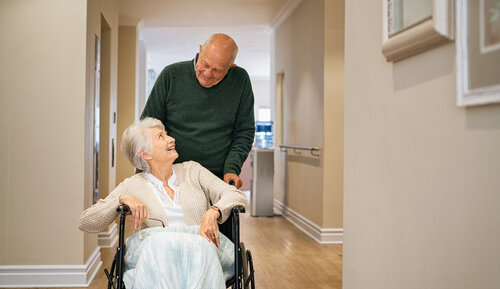
Image credit: Care for Veterans – Resident veteran Steve Boylan in the gardens at Care for Veterans
Page contents
Serving for HM armed forces is something that has a huge impact on your life. No matter how long you served for, being part of the military can shape who you are and how you live your life, long after your duty ends.
Whether you’re looking for care in your later years or need assistance recovering from an injury or illness, veterans care homes support people who have served in the armed forces.
Who is eligible for a veteran care home?
Individual care settings may differ in criteria. But any person who has served in the armed forces or is an immediate family member of a veteran, is eligible to live as a resident in a veteran care home.
In most cases, there are no age restrictions for veteran care homes. You will be welcomed with open arms to whichever setting you choose.
What are care homes for veterans?
Care homes that cater to military personnel are focused on acknowledging residents’ experience of serving in the forces. This is done in a range of ways.
How do veteran care homes help ex-military?
Acknowledge routines and traditions
From being addressed as your rank, to waking up at a certain time of the day, having your bedroom neat and tidy and ironing your clothing in a particular way, there are lots of routines that veterans are accustomed to.
The Royal Hospital Chelsea is home to the famous Chelsea Pensioners. Purpose built, the home offers a comfortable setting with high quality care for Britain’s Army veterans.

A spokesperson for the Royal Hospital Chelsea says: “Many of the routines and traditions at the Royal Hospital Chelsea echo those experienced during Army service, and with this comes a familiar way of living and an instant bond and camaraderie based around shared military experiences.
“As a centuries-old institution, many of the military traditions and postings endure at the Royal Hospital – groups of Pensioners are divided into Companies with a Captain allocated to oversee their welfare. The Quartermaster manages facilities and estates, a Matron is responsible for care in the Infirmary building and a Chaplain oversees religious services on-site. In addition, a senior member of the British Army is traditionally appointed by the Monarch as Governor of the Royal Hospital.”
“Chelsea Pensioners are encouraged to wear their blue day-to-day uniform, including their cap badges and stable belts, and it is mandatory to wear the scarlet uniform when representing the Royal Hospital on a recognised visit or when on parade, such as the annual Founder’s Day parade in June.”
Recognise people’s personal history
Learning about and acknowledging about each resident’s background is something most care homes strive to do. It can be challenging for carers who support a number of residents from vastly different walks of life.
Care homes for veterans have the advantage of collating a group of residents who, although won’t have the exact same experiences, have a collective history. This makes it possible to appreciate and celebrate anniversaries, events, or just share stories from the past.
A spokesperson for Care for Veterans, a residential setting in Worthing says: “We hold special services for memorial days such as Remembrance Day and commemorate other significant dates such as VE Day and D Day in our activities. We provide opportunities for resident veterans to get involved with military-related events locally and nationally to ensure that they stay well-connected with the wider community.“
Tailored activities and events
Most care homes offer activities and events for residents. These help to boost socialising and keep residents engaged. Care homes for veterans may tailor some of these activities to specifically suit their residents’ history. This includes visits from military organisations or trips out to remembrance services.
The Royal Hospital Chelsea has a particular focus on this:
“The close links between the British Army mean that the Hospital often collaborates with serving soldiers for parades, commemorative activities and fundraising for charities, and the Hospital welcomes veterans from the tri-Services to visit and take part in our new Veteran Outreach programme.
“The social life of the Royal Hospital is rich and varied with a number of activities on offer every week, such as bingo, gardening, film nights, pottery and bridge club.
“There are also frequent invitations to attend special events outside the Royal Hospital, from charity fundraisers to sporting fixtures. Every year Chelsea Pensioners have the opportunity to represent the Royal Hospital at various ceremonial and commemorative events, including at the National Service of Remembrance at the Cenotaph.”
Create a sense of togetherness
Moving to a care home comes with an inevitable loss of the lifestyle you have led up until this point. There are some things that cannot be replicated for veterans in a care home, such as the bonds you have created with those you love over the years.

Commenting on the importance of creating a collective environment for residents, a spokesperson for Care for Veterans says:
“The military is like a family; those who have served often have a common understanding – from their values to lived experiences.
“Moving into a care home can be an unsettling experience but knowing that there will be people there who will relate to you in such a unique way can make residents feel united and like they’ve found a home from home. Their commonalities unite them and enable them to befriend others easily.”
The Veteran Friendly Framework (VFF)
Launched in October 2023, the Veteran Friendly Framework is a two year scheme aiming to improve the care home experience of veterans and their family members across England.
This is a collaboration between Royal Star & Garter, Royal British Legion and NHS Veterans Covenant Healthcare Alliance. The scheme addresses loneliness and isolation as well as health and wellbeing outcomes amongst the veteran community within care homes by training and providing resources to care providers.
Royal British Legion director, General Charles Byrne, said: “Most veterans are cared for in civilian homes that in some cases, may not fully understand their social, emotional or physical needs. The exciting potential of this project is to raise the standards of care received by all members of the Armed Forces community living in all care homes.”
To achieve VFF accreditation, care home settings will need to:
- Sign the Armed Forces Covenant
- Assign an Armed Forces Community Champion/s to support and deliver the framework
- Include Armed Forces Community status in the relevant people’s care plans
- Share a person’s Armed Forces Community status with clinical services to ensure they receive appropriate care
- Train and educate staff members in the needs of the Armed Forces Community
- Establish and maintain links to local services for the Armed Forces Community
- Support the UK Armed Forces as an employer
- Raise awareness of the Armed Forces Community
Lightbowne Hall, located in Manchester and owned by Anchor, is one of the civilian homes which has benefitted from the scheme.
Rebecca Mardy, manager of the home, says: “As a home we have learned just how much help and support is available. Staff have a much better understanding of our veterans and it has opened a completely new field of conversations.”
You can find more information about the Veteran Friendly Framework here.
How to find care homes for veterans
Like other care homes, residential settings catering to the armed forces community may differ in the type and level of care they offer.
For example, different homes might provide:
- Nursing care
- Dementia care
- Respite care
- Day care
Before you begin looking for a care home, you should consider your needs now and in the future. Bear in mind that not all residential settings offer nursing care. You can read our article here to find out more about how residential care homes differ from nursing homes.
Across the UK, there are a number of care homes catering specifically to the armed forces community. Depending on where you live, there may be one in your local area.
As well as the Royal Hospital Chelsea and Care for Veterans, other providers include:
Royal Star & Garter
They provide loving, compassionate care to veterans and their partners from homes based in Solihull, Surbiton and High Wycombe.
Royal British Legion
RBL has six care homes located across England for ex-Service people and their dependants.
You can find out more about their homes on their website.
Other veteran care homes include:
- Admiral Jellicoe House for veterans of the Royal Navy
- RBLI Living for single veterans
- Erskine offering homes for veterans in Scotland
Remember that all care homes should offer person-centred care and support that recognises every person as an individual.
Find your ideal care home
- Explore a wide range of care options and facilities
- Read independent ratings and reviews
- Connect directly with care homes to book a tour and discuss your needs


